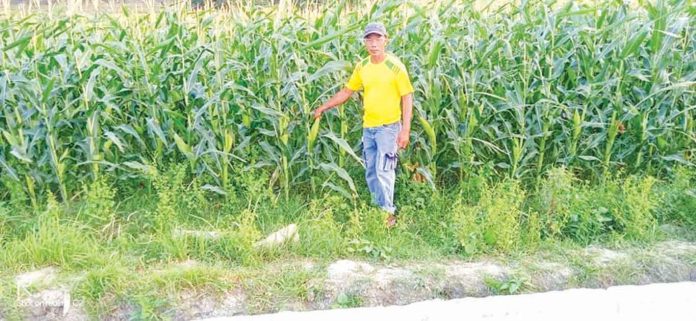
VALDERRAMA, Antique – Yellow corn farmer Johann Roquero, 43, generated P62,169 worth of revenue from the first cropping of his corn production project from the Department of Agriculture – Special Area for Agriculture Development (DA-SAAD) Program.
Roquero leads the 42-member Takas Imbangga-an Tangke Irrigators’ Association (TITIA) from Barangay Takas, Valderrama. He manages a 1.5-hectare (ha) area which he uses for corn production.
From August to December 2021, Roquero harvested 56 sacks of corn weighing 3,360 kilograms (kg) and sold at P18.50/kg. After deducting the hauling, drying, land preparation fees, and other expenses, Johann had a net income of P46,270.
Roquero’s family earns from cultivating vegetables, rice, sugarcane, and corn. His wife, meanwhile, occasionally does cleaning work at the public market for extra income just enough for a day’s food. The couple both earn around P2,000 to P3,000 income per month.
Now that he became a beneficiary of SAAD, Roquero said he got a higher production in planting corn compared to his previous harvest that ranges from 25 to 30 sacks. It also helped him pay his debts, sustain his family needs, and pay his children’s school fees.
“Salamat sa hangud nga bulig nga gintugro kang SAAD Program sa akon kag sa amon asosayon. Naka-income gid ako sa mais nga akon na-harvest kag nabaligya,” said Roquero.
Takas Imbangga-an Tangke IA
In Barangay Takas, farming has always been the main source of income of the locals to provide for their families’ needs and children’s education. Rice is the main produce but they also grow sugarcane, vegetables, and root crops.
Rice farms are cultivated mostly in irrigated ecosystem. The rice is grown in paddies with erected bunds created to keep water on the fields during tillage.
A long dry spell due to the effects of climate change hindered some farmers in the town from planting rice for several cropping seasons in the previous years. Others also often lack capital for their farm inputs and most of them rely on credit for their needs.
In 2016, Roquero formed the TITIA composed of 20 initial members in a bid to seek assistance from various government agencies. In June that year, the group was able to register to the Department of Labor and Employment (DOLE).
Early in 2021, Johann and some of the TITIA farmers joined a consultation of the SAAD Program where they learned about the mechanics of the program and the various agricultural interventions it offers. With the guidance of the Municipal Agriculturist’s Office (MAO) in the project proposal, TITIA pursued the Corn Production Project.
The SAAD project amounting to P1,326,000 was delivered to the association in August 2021. It consisted of corn seeds (40 bags), inorganic fertilizer (140 bags), plows (seven pieces), harrows (seven pieces), caracows (10 heads), and corn shellers (two units).
Challenges Encountered
Some association members initially hesitated to cultivate corn. Majority of the locals had their reservations since introducing corn in a rice-dominated area was relatively new to the community.
However, through SAAD’s inputs, corn production became accessible to farmers since they don’t need to draw capital.
After cultivating corn for months, Roquero realized the crop is easier to grow than rice and less capital intensive, thus could reduce his expenses and provide higher income.
However, marketing of corn produce became a major challenge for Johann. To ensure buyers for his corn produce, the MAO assisted him in coordinating with suppliers in the town’s public market. He eventually made a deal with a local corn mill operator who supplies chicken feeds to local stores.
TITIA farmers were also upskilled through Corn Production, Enterprise Development and Caracow Raising Training in 2021.
Roquero said these training provided them better understanding of proper corn cultivation, food processing and awareness of proper food handling practices which they may apply for value-adding ventures.
Plans
Yellow corn, which the group cultivates, is used as feeds for poultry animals and as an ingredient for other corn by-products. The TITIA plans to venture into trading of poultry feeds supply.
“Kun sige-sige run ang manami nga harvest namon sa amon corn production, kami nagaplano nga magpatindog sang isa ka feeds supply store sa banwa,” said Roquero.
For now, the group is preparing their lands for the next cropping and planning to buy new corn seeds from their income. (DA-6/PN)



